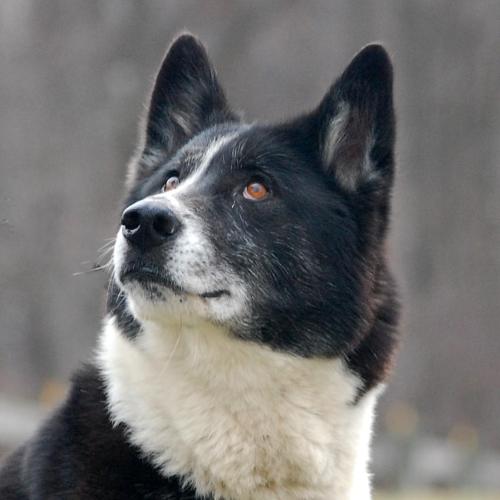 Delta leaps out of the horse trough and gallops up the hill toward me. She runs like a horse, not a dog. She kathumps-kathumps-kathumps in long strides through clover and buttercup. No gliding for her. Her power resides in those big shoulders and deep chest. She is a Karelian bear dog, and I am falling in love, and I know that I cannot take her home.
Delta leaps out of the horse trough and gallops up the hill toward me. She runs like a horse, not a dog. She kathumps-kathumps-kathumps in long strides through clover and buttercup. No gliding for her. Her power resides in those big shoulders and deep chest. She is a Karelian bear dog, and I am falling in love, and I know that I cannot take her home.
When she is a few feet away, I crank and throw a tennis ball as far as I can; Delta sprints past me, picking up speed on the flat, overrunning the ball and then using her wolfy front paws to dig in and turn. She noses the ball and drops onto it; it rests between her front paws. When I sit down next to her, she slyly looks up at me, noses the ball once more and waits for me to slowly reach and take it. She has small eyes, big teeth and a wide grin.
Karelians were bred to hunt bear out of sight of their owners and remain so independent that they require enormous time to teach a basic command of ‘Come’. She cannot be walked without a leash, probably ever. They are a one dog per family breed — our border collie cuts us out of adopting her.
Delta carries herself with a supreme alpha presence. She does not aggressively confront other dogs, but instead demonstrates a kind of hauteur like a beautiful woman trained in hand-to-hand combat who can hand you your behind if you offend her. Most other dogs defer to her. She will do as you wish if it pleases her — the key to training is to find ways to please her that correspond with good sense and peace. She will not give up her loyalty just because someone ‘owns’ her; loyalty must be earned. I run her in a fenced paddock and stay engaged and watch her careen back and forth, and munch tennis balls and think. She is glorious.
 Axel is a German Shepard-Akita mix who looks like a fox dressed in a muscle suit. He is a gentleman, easy on the leash, trained to multiple commands, responsive to affection, rescued by The Refuge when his owner was deployed. His is the dignity of an animal conscious of his power who has learned restraint and control.
Axel is a German Shepard-Akita mix who looks like a fox dressed in a muscle suit. He is a gentleman, easy on the leash, trained to multiple commands, responsive to affection, rescued by The Refuge when his owner was deployed. His is the dignity of an animal conscious of his power who has learned restraint and control.
Each of these names — Delta, Axel, Topaz, Beckett, Cooper, Sara, Simon, Liam, Elizabeth the Great, even, I swear, Moby Dick the Staffordshire Terrier, Lindsey and Jelly Bean and 25 more bring to my eye individuals who bear the stresses of kennel life and the limbo-existence of a rescue dog with extraordinary grace and patience. They teach me to pause and observe before acting, and thus I see in them again and again the dilemma in which dogs find themselves — most are noble animals whose dependence upon us is absolute. They are so exposed to both our cruelty and our goodness that they are a very effective Rorschach test — human beings who mistreat a dog bear something of the truly fearful beast in their hearts. They are never to be trusted.
I walk them, hold them, clean them, restrain them, pet and whisper to them, try to train them, try to keep seeing behind their eyes so that I might understand more, and week by week hope that someone will have come to The Refuge and said, “You, yes you the black and white, you the smiler, you the wild man, you, the sweet girl, you the one with the calm gaze, yes you are the one for me,” and that those chosen will have disappeared into a life where they will finally be rewarded for their honor and for their remarkable gift in teaching us how to love effortlessly.
As an animal lover–especially dogs–I am saddened by the stories of dogs who cannot find a family to love them. I think we’re drawn to dogs because they are carefree, energetic, majestic, and loyal–qualities that more of us should share. If more of us did, less dogs would be in search of a family.